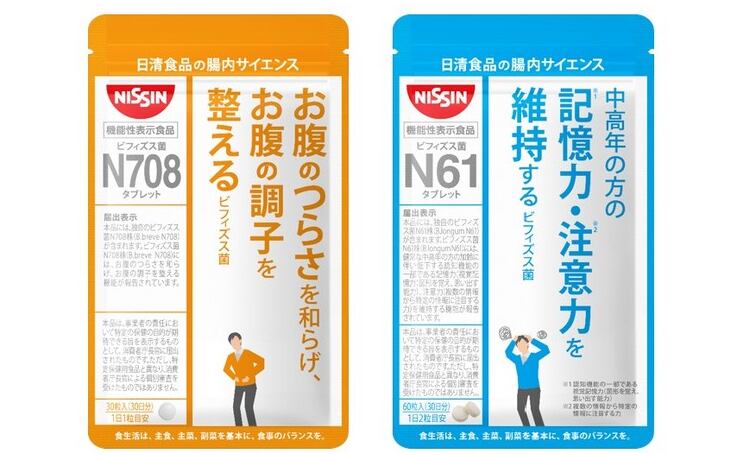The new FFC launched were Bifidobacterium N708 Tablets and Bifidobacterium N61 Tablets. The former claims to relieve stomachache, while the latter was designed to improve memory and attention which decline with ageing.
“There are not many products in the market that contain lactic acid bacteria with the function of alleviating stomachache,” said Haruka Aoki, unit manager, corporate communication division at Nissin Foods Holdings, on the reason for the launch.
About one in every 10 Japanese suffer from IBS.
On the other hand, the company believes that using lactic acid bacteria to support cognitive function could help differentiate its product from other products with similar functions.
“Most of the products claiming to maintain ‘memory and attention’ contain typical ingredients such as DHA & EPA, and few were developed based on the concept of gut-brain axis.
“In recent years, it has become clear that intestinal bacteria are closely related to health, and there is growing interest in the "brain-gut correlation," which refers to the functional relationship between the brain and the intestines, including intestinal bacteria,” she said.
Nissin has been researching on lactic acid bacteria for over 50 years, she pointed out.
“This time, a team specialising in anti-aging research took the lead in commercialising Nissin Food Products’ proprietary lactic acid bacteria, Bifidobacterium breve N708 strain (B. breve N708) and Bifidobacterium longum N61 strain (B. longum N61), after demonstrating new functions through clinical trials.”
She added that FFC was one of the fastest growing categories in Japan’s health food market and was expected to be driven by demand from both the elderly suffering from lifestyle-related diseases and mobility issues to the younger crowd.
On top of the two FFCs, a Food with Nutrient Function Claims (FNFC) known as Aller-light Protect was also launched.
Clinical findings
The supplementation of Bifidobacterium breve N708 for eight weeks has been shown to significantly improve stress-related diarrhoea.
This is according to an eight-week clinical study involving 63 people. Findings were published in year 2019 in the journal Japanese Pharmacology & Therapeutics (JPT).
Sixty-three participants suffering from daily stress and diarrhoea accompanied by abdominal pain and discomfort were randomised to consume food containing Bifidobacterium breve N708 or the placebo.
During the study, they also had to undergo blood test and answer questionnaires that evaluate their gastrointestinal symptoms to assess the effects of Bifidobacterium breve N708.
“The results from the Izumo scale showed that the subjects who took the test diet showed significant improvement in diarrhoea problems when under severe stress as compared to those who took the placebo diet at the eight week of the study,” said Aoki.
The Izumo Scale is a questionnaire used to ascertain symptoms of the digestive tract in the upper to abdominal digestive tract.
Another trial involving 60 adults between 50 and 69 years old also took place to find out the effects of heat-killed cells of Bifidobacterium longum N61 on memory and neurocognitive functions in healthy elderly with perceived memory impairment.
The participants were randomised to receive foods containing Bifidobacterium longum N61 or the placebo for 12 weeks.
Results showed significant improvement in visual learning and geometric shape memory and recognition, and significant decreases in composite reaction times on tests of speed and accuracy of information processing in the intervention group, Aoki pointed out.
The findings were also published on Japanese Pharmacology & Therapeutics (JPT).





